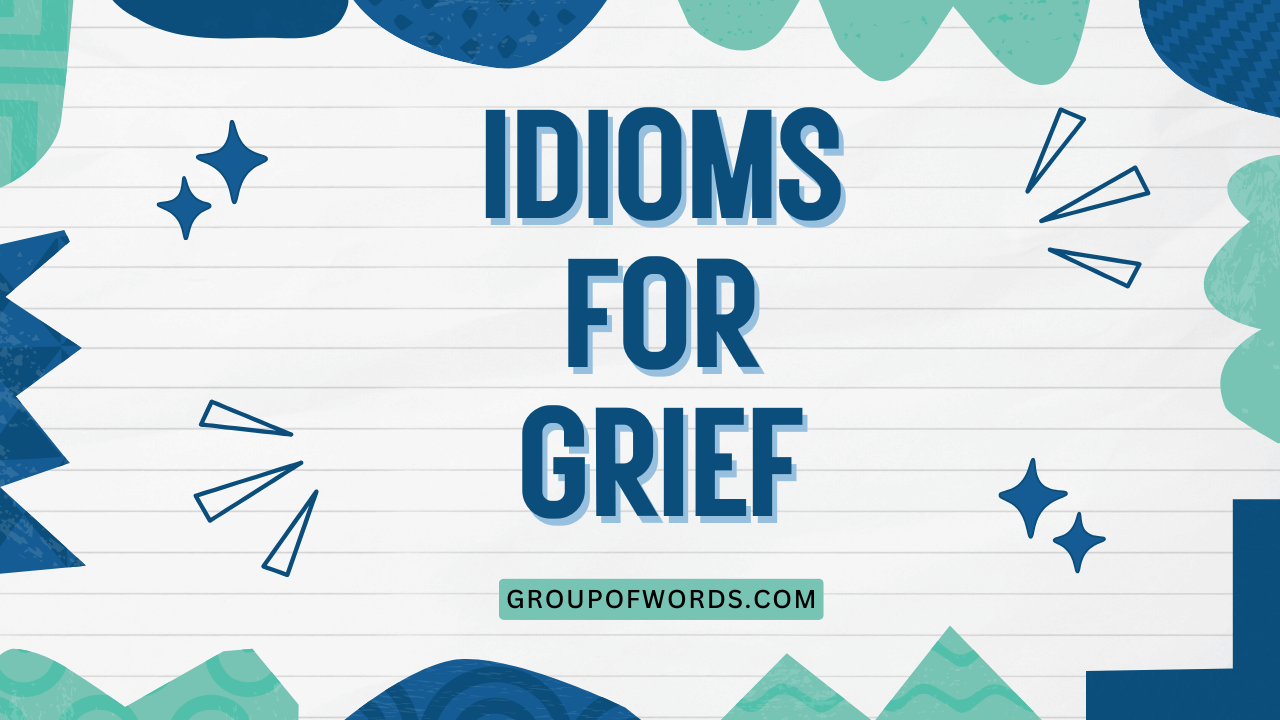Idioms for Grief: Expressing Sorrow and Loss
Grief is a universal human experience, yet expressing it can be deeply personal and often challenging. English offers a rich tapestry of idioms to articulate the nuances of sorrow, loss, and the emotional aftermath.
Understanding these idioms not only expands your vocabulary but also provides a deeper insight into the cultural understanding and expression of grief. This article explores various idioms related to grief, their meanings, usage, and provides examples to help you use them effectively.
This guide will benefit English language learners, writers, and anyone seeking a more nuanced vocabulary to discuss and understand grief.
Table of Contents
- Introduction
- Definition of Idioms for Grief
- Structural Breakdown of Grief Idioms
- Types of Grief Idioms
- Examples of Idioms for Grief
- Usage Rules for Grief Idioms
- Common Mistakes with Grief Idioms
- Practice Exercises
- Advanced Topics in Grief Idioms
- FAQ: Frequently Asked Questions
- Conclusion
Definition of Idioms for Grief
Idioms for grief are expressions whose meanings cannot be understood simply by combining the literal meanings of the individual words. Instead, they represent a figurative, culturally specific way of describing the emotional states, processes, and experiences associated with grief and loss. These idioms can range from metaphors that portray the intensity of sadness to phrases that describe the gradual process of healing. Grief idioms function as a shorthand, allowing speakers to convey complex emotions with a single, evocative phrase. They provide a shared understanding, helping people connect and empathize with one another during times of sorrow.
The use of idioms related to grief varies depending on the context. In formal settings, more direct and literal language might be preferred to avoid ambiguity.
However, in informal conversations, personal narratives, or creative writing, these idioms can add depth and emotional resonance. Understanding the nuances of these idioms allows for more effective and empathetic communication, providing a vocabulary to navigate the complexities of grief.
Structural Breakdown of Grief Idioms
The structural elements of grief idioms vary widely, reflecting the diverse ways in which grief is conceptualized and expressed. These idioms can include:
- Metaphors: These idioms use figurative language to compare grief to something else, such as a physical burden (“a heavy heart”) or a natural phenomenon (“a storm of emotions”).
- Similes: Similes use “like” or “as” to draw comparisons, such as “feeling as empty as a tomb.”
- Personification: Giving human qualities to grief, such as “grief knocking at the door.”
- Euphemisms: These idioms soften the directness of loss, providing a gentler way to discuss death or sorrow, such as “passed away” instead of “died.”
The patterns within grief idioms often involve common themes, such as the weight of sadness, the darkness of despair, or the gradual journey toward healing. Understanding these patterns can help learners recognize and interpret new idioms more easily.
For instance, many idioms use the imagery of water (tears, drowning in sorrow) or darkness (shadow of grief, dark days) to convey the intensity and overwhelming nature of grief.
Types of Grief Idioms
Grief idioms can be categorized based on the specific aspect of grief they describe. Here are some primary categories:
Idioms Expressing Intense Sadness
These idioms capture the overwhelming and profound nature of grief, often using vivid imagery to convey the depth of sorrow.
Idioms Expressing the Process of Grieving
These idioms describe the stages and experiences involved in the grieving process, from initial shock to eventual acceptance.
Idioms Expressing Coping with Grief
These idioms focus on the actions and strategies people use to manage and overcome their grief.
Idioms Expressing Loss and Absence
These idioms highlight the sense of emptiness and longing that accompanies the loss of a loved one.
Examples of Idioms for Grief
Here are some examples of idioms for grief, organized by category, to illustrate their usage and meaning.
Examples: Intense Sadness
The following table provides examples of idioms that express intense sadness. Each idiom is accompanied by its meaning and example sentence.
| Idiom | Meaning | Example Sentence |
|---|---|---|
| A heavy heart | Feeling deeply saddened or burdened by sorrow. | She carried a heavy heart after the funeral. |
| Down in the dumps | Feeling depressed or very sad. | He’s been down in the dumps ever since he lost his job. |
| Feeling blue | Feeling sad or melancholic. | She’s been feeling blue since her grandmother passed away. |
| Heartbroken | Extremely sad or emotionally devastated. | She was heartbroken when her relationship ended. |
| Tears welling up | The act of starting to cry. | Tears welled up in her eyes as she spoke about her childhood. |
| A lump in one’s throat | A tight feeling in the throat caused by strong emotion, often sadness. | He had a lump in his throat as he delivered the eulogy. |
| A weight on one’s shoulders | Feeling burdened by responsibility or sorrow. | The news put a weight on his shoulders. |
| Inconsolable | Unable to be comforted. | She was inconsolable after hearing the tragic news. |
| At the end of one’s rope | Having no strength or patience left to cope with a difficult situation. | After weeks of sleepless nights, she was at the end of her rope. |
| A dark cloud hanging over | A sense of gloom or sadness pervading a situation. | A dark cloud hung over the family after the accident. |
| To be in deep water | To be in serious trouble or difficulty, often emotionally. | He’s been in deep water since his business failed. |
| To have a frog in one’s throat | To have difficulty speaking due to emotion. | She had a frog in her throat when she tried to thank everyone. |
| To feel like one’s world is falling apart | To feel that one’s life is collapsing or becoming chaotic. | She felt like her world was falling apart after the divorce. |
| To be at rock bottom | To be at the lowest possible point in one’s life. | He was at rock bottom after losing everything. |
| To feel hollow inside | To feel empty and devoid of emotion. | She felt hollow inside after her children left home. |
| To have a sinking feeling | To feel a sense of impending doom or sadness. | He had a sinking feeling when he saw the police car outside. |
| To be overcome with grief | To be overwhelmed by intense sadness. | She was overcome with grief at the funeral. |
| To be drowning in sorrow | To be overwhelmed by sadness. | He was drowning in sorrow after the loss of his wife. |
| To wear one’s heart on one’s sleeve | To openly display one’s emotions, often sadness. | She wears her heart on her sleeve, so everyone knows when she’s upset. |
| To cry one’s eyes out | To cry intensely for a long period of time. | She cried her eyes out when she heard the news. |
| A broken heart | Intense emotional pain or sorrow, especially after the end of a romantic relationship or the death of a loved one. | She suffered from a broken heart after her husband passed away. |
Examples: Grieving Process
The following table provides idioms related to the grieving process, describing the journey from initial shock to eventual healing.
| Idiom | Meaning | Example Sentence |
|---|---|---|
| Time heals all wounds | The passage of time will lessen the pain of grief. | They say time heals all wounds, but it still hurts. |
| Coming to terms with | Accepting a difficult situation or loss. | She is slowly coming to terms with her father’s death. |
| Turning a corner | Making a positive change or improvement after a difficult period. | He felt like he was turning a corner in his recovery. |
| Moving on | Leaving the past behind and starting a new chapter. | It’s hard, but eventually, you have to move on. |
| Going through the motions | Doing something without enthusiasm or genuine feeling. | He was just going through the motions at work after the tragedy. |
| In mourning | Experiencing sorrow for a death or loss. | The family is still in mourning after the sudden passing. |
| A period of adjustment | A time of adapting to new circumstances after a change or loss. | There will be a period of adjustment after the surgery. |
| Wallowing in sorrow | Indulging in feelings of sadness or grief. | It’s important not to wallow in sorrow for too long. |
| The first step is always the hardest | Starting something new or difficult is often the most challenging part. | The first step is always the hardest when trying to heal. |
| One day at a time | Taking things slowly and focusing on the present. | She’s taking it one day at a time after the accident. |
| Working through grief | Actively processing and dealing with the emotions of grief. | She’s working through her grief with the help of a therapist. |
| A long road ahead | A difficult or lengthy process to be completed. | He knew he had a long road ahead in his recovery. |
| To pick up the pieces | To try to return to a normal life after a disaster or setback. | She’s trying to pick up the pieces after the business failure. |
| To turn over a new leaf | To start behaving in a better way. | He decided to turn over a new leaf and quit drinking. |
| To weather the storm | To survive a difficult situation. | We’ll weather the storm together. |
| To take things in stride | To deal with problems calmly and without getting upset. | She takes things in stride, even in difficult situations. |
| To put the past behind you | To forget about past hurts or mistakes and move forward. | It’s time to put the past behind you and start anew. |
| To bury the hatchet | To make peace after a disagreement. | They decided to bury the hatchet and become friends again. |
| To heal with time | The process of gradually recovering from emotional pain. | She will heal with time, but it will take a while. |
| To rebuild one’s life | To reconstruct one’s life after a major setback. | He is determined to rebuild his life after the disaster. |
Examples: Coping with Grief
The following table illustrates idioms related to coping with grief, focusing on strategies and actions that help manage sorrow.
| Idiom | Meaning | Example Sentence |
|---|---|---|
| Finding solace | Seeking comfort or relief from grief. | She found solace in her friends and family. |
| Seeking support | Looking for help and understanding from others. | He is seeking support from a grief counseling group. |
| Keeping busy | Staying active to distract oneself from sorrow. | She’s been keeping busy to take her mind off things. |
| Holding it together | Managing to remain strong and composed despite grief. | He’s trying to hold it together for his children. |
| Putting on a brave face | Pretending to be happy or unaffected by grief. | She was putting on a brave face, but inside she was hurting. |
| Finding strength | Discovering inner resilience to cope with grief. | She found strength in her faith during the difficult time. |
| Taking comfort in | Finding reassurance or consolation in something. | He took comfort in the memories of his wife. |
| Leaning on others | Relying on friends and family for support. | She’s leaning on her friends for emotional support. |
| Counting one’s blessings | Focusing on the positive aspects of life despite grief. | He started counting his blessings to feel more grateful. |
| Keeping one’s chin up | Staying positive and optimistic despite difficulties. | She’s trying to keep her chin up despite the challenges. |
| Making the best of a bad situation | Finding ways to cope and improve a difficult circumstance. | They’re making the best of a bad situation after the fire. |
| Finding peace | Achieving a sense of calm and acceptance despite grief. | She’s slowly finding peace with her loss. |
| To turn to someone | To seek help or support from someone. | She turned to her sister for comfort. |
| To find a silver lining | To find something positive in a negative situation. | He tried to find a silver lining in the tragedy. |
| To keep the faith | To maintain hope and belief in something. | They kept the faith that things would get better. |
| To take heart | To feel encouraged or heartened. | She took heart from the support of her friends. |
| To stay strong | To remain resilient and not give in to despair. | She’s trying to stay strong for her children. |
| To look on the bright side | To focus on the positive aspects of a situation. | He’s trying to look on the bright side despite the setbacks. |
| To seek closure | To find a sense of resolution or acceptance after a loss. | She’s trying to seek closure after the relationship ended. |
| To carry on | To continue with life despite difficulties. | She decided to carry on for the sake of her family. |
Examples: Loss and Absence
The following table presents idioms that describe the feeling of loss and absence after someone has passed away.
| Idiom | Meaning | Example Sentence |
|---|---|---|
| Gone but not forgotten | Remembered and cherished even after death. | He is gone but not forgotten by those who loved him. |
| A void in one’s life | A feeling of emptiness due to the absence of someone. | Her death left a void in his life. |
| In loving memory | Remembered with affection and fondness. | The plaque reads, “In loving memory of John Smith.” |
| Left a lasting impression | Had a significant and enduring impact. | She left a lasting impression on everyone she met. |
| A shadow of their former self | Reduced in strength or vitality due to grief. | He was a shadow of his former self after his wife died. |
| No longer with us | Having passed away. | He is no longer with us, but his memory lives on. |
| Left behind | Remaining after someone has passed away. | She was left behind to raise the children alone. |
| An empty chair | A symbol of someone’s absence. | There was an empty chair at the table during Thanksgiving. |
| In a better place | Having passed away and now in a peaceful afterlife. | They say she’s in a better place now. |
| Passed on | Died (a euphemism). | He passed on peacefully in his sleep. |
| Crossed over | Died (a euphemism). | She has crossed over to the other side. |
| At peace | Resting peacefully after death. | He looked at peace in his final moments. |
| To be missed | To be longed for and remembered fondly. | He will be missed by all who knew him. |
| To leave a legacy | To leave behind a significant impact or contribution. | She left a legacy of kindness and compassion. |
| To cherish the memories | To hold dear the fond recollections of someone. | We will always cherish the memories of our time together. |
| To live on in our hearts | To continue to be remembered and loved. | He will live on in our hearts forever. |
| To rest in peace | To be at peace after death (often abbreviated as RIP). | May he rest in peace. |
| To go to a better place | To die and go to a peaceful afterlife. | She has gone to a better place. |
| To be gathered to one’s ancestors | To die and join one’s deceased relatives (formal, often used in historical contexts). | He was gathered to his ancestors after a long illness. |
| To fade away | To gradually disappear or decline, often referring to health or life. | She slowly faded away in her final days. |
Usage Rules for Grief Idioms
Using idioms correctly requires understanding their specific meanings and contexts. Here are some rules to follow:
- Context matters: Be mindful of the situation and audience. Informal idioms may not be appropriate in formal settings.
- Meaning accuracy: Ensure you understand the precise meaning of the idiom before using it. Misusing an idiom can lead to confusion or miscommunication.
- Cultural sensitivity: Be aware that some idioms may have cultural connotations or sensitivities. Consider your audience and the potential impact of your words.
- Grammatical correctness: Use the idiom in a grammatically correct sentence. Pay attention to verb tenses, subject-verb agreement, and other grammatical rules.
For example, saying “He’s feeling blue” is appropriate in casual conversation to indicate sadness. However, in a formal report, it would be more suitable to say “He is experiencing a period of sadness.”
Common Mistakes with Grief Idioms
Here are some common mistakes people make when using idioms related to grief:
| Incorrect | Correct | Explanation |
|---|---|---|
| She’s feeling the blue. | She’s feeling blue. | The definite article “the” is unnecessary and incorrect. |
| He had a heavy heartedly. | He had a heavy heart. | “Heartedly” is an adverb, while “heart” is the correct noun. |
| They are coming to terms with the loss of he. | They are coming to terms with his loss. | Using the correct possessive pronoun “his” is essential. |
| She’s keeping busy from the grief. | She’s keeping busy to cope with her grief. | The preposition “to cope with” clarifies the purpose of keeping busy. |
| She put on a brave head. | She put on a brave face. | The idiom is “brave face,” not “brave head.” |
| He’s leaning to others for support. | He’s leaning on others for support. | The correct preposition is “on,” not “to.” |
| They are taking comfort with the memories. | They are taking comfort in the memories. | The correct preposition is “in,” not “with.” |
| She’s holding it together by her children. | She’s holding it together for her children. | The correct preposition is “for,” indicating the reason. |
| He has a void on his life. | He has a void in his life. | The correct preposition is “in,” not “on.” |
| She gone but not forgetten. | She’s gone but not forgotten. | The correct verb form is “gone” and the correct spelling is “forgotten.” |
Practice Exercises
Test your understanding of grief idioms with these exercises.
Exercise 1: Fill in the blanks with the correct idiom.
| Question | Answer |
|---|---|
| After losing his job, he was really __________. | down in the dumps |
| She was __________ after her cat died. | heartbroken |
| __________ will eventually lessen the pain. | Time heals all wounds |
| He is __________ with the loss of his father. | coming to terms |
| She is __________ for her children after the tragedy. | holding it together |
| He found __________ in helping others. | solace |
| She __________ after her husband passed away. | had a heavy heart |
| He’s trying to __________ and move forward. | pick up the pieces |
| She __________ to stay strong for her family. | keeps her chin up |
| He’s __________ since his business failed. | been in deep water |
Exercise 2: Match the idiom with its meaning.
| Idiom | Meaning |
|---|---|
| 1. A lump in one’s throat | a. Feeling empty due to absence |
| 2. A void in one’s life | b. Feeling overwhelmed by sadness |
| 3. Drowning in sorrow | c. Tight feeling in throat due to emotion |
| 4. Putting on a brave face | d. Pretending to be happy |
| 5. Gone but not forgotten | e. Remembered and cherished |
Answers: 1-c, 2-a, 3-b, 4-d, 5-e
Exercise 3: Rewrite the following sentences using idioms related to grief.
| Original Sentence | Rewritten Sentence |
|---|---|
| She was very sad after the breakup. | She was heartbroken after the breakup. |
| He is trying to accept his mother’s death. | He is coming to terms with his mother’s death. |
| She is trying to remain strong for her family. | She is trying to hold it together for her family. |
| He is remembering his deceased friend fondly. | He is cherishing the memories of his friend. |
| She is feeling depressed after the accident. | She is down in the dumps after the accident. |
| He is trying to deal with his problems calmly. | He is trying to take things in stride. |
| She is focusing on the positive aspects of her life. | She is counting her blessings. |
| He is seeking help from a therapist. | He is seeking support from a therapist. |
| She is trying to forget the past and move on. | She is trying to put the past behind her. |
| He died peacefully in his sleep. | He passed on peacefully in his sleep. |
Advanced Topics in Grief Idioms
For advanced learners, exploring the etymology and cultural context of grief idioms can provide a deeper understanding. Some idioms have historical roots that shed light on their meanings.
For instance, “bury the hatchet” comes from a Native American tradition of burying a tomahawk to symbolize peace. Understanding these origins can enrich your appreciation of the language.
Additionally, analyzing how grief idioms are used in literature and poetry can offer insights into their artistic and emotional impact. Authors often use idioms to create vivid imagery and convey complex emotions in a concise and powerful way.
Paying attention to these uses can enhance your reading comprehension and writing skills.
Furthermore, comparing grief idioms across different languages can reveal cultural differences in how grief is expressed and understood. Some cultures may emphasize the importance of mourning publicly, while others may prioritize private reflection.
Exploring these differences can broaden your perspective and promote cross-cultural understanding.
FAQ: Frequently Asked Questions
- What is the difference between an idiom and a literal expression?
An idiom is a phrase whose meaning cannot be understood from the literal definitions of its individual words. A literal expression, on the other hand, means exactly what the words suggest. For example, “feeling blue” is an idiom for sadness, while “the sky is blue” is a literal statement about the color of the sky.
- Why are idioms important in English?
Idioms are important because they are a common part of everyday language. Understanding idioms allows you to communicate more effectively and comprehend native speakers more easily. They also add color and expressiveness to your language.
- How can I learn new idioms effectively?
The best way to learn idioms is through exposure and context. Read widely, listen to native speakers, and pay attention to how idioms are used in different situations. Keep a notebook of new idioms and practice using them in your own speech and writing. Flashcards and online resources can also be helpful.
- Are grief idioms appropriate for all situations?
No, grief idioms are not always appropriate for all situations. In formal settings, it is often better to use more direct and literal language. However, in informal conversations, personal narratives, or creative writing, grief idioms can add depth and emotional resonance.
- How do I avoid misusing idioms?
To avoid misusing idioms, make sure you understand their precise meaning and context. If you are unsure, look up the idiom in a dictionary or ask a native speaker for clarification. Practice using the idiom in simple sentences before incorporating it into more complex communication.
- Can idioms have different meanings in different cultures?
Yes, idioms can have different meanings or may not exist at all in different cultures. It is important to be aware of these cultural differences and to avoid using idioms that may be offensive or misunderstood.
- What resources can I use to learn more about grief idioms?
There are many online dictionaries and resources that provide definitions and examples of idioms. Textbooks and language learning websites often include sections on idioms. Additionally, reading literature and watching movies or TV shows can expose you to idioms in context.
- How do I know when an expression is an idiom rather than a literal phrase?
If the meaning of an expression is different from the literal meanings of the individual words, it is likely an idiom. Additionally, idioms often have a figurative or metaphorical quality that distinguishes them from literal phrases.
Conclusion
Understanding idioms for grief is essential for expressing and comprehending the complex emotions associated with loss. These idioms provide a nuanced vocabulary that allows for more empathetic and effective communication.
By learning the different types of grief idioms, their usage rules, and common mistakes to avoid, you can enhance your English language skills and connect with others on a deeper emotional level.
Continue to expand your knowledge of idioms through reading, listening, and practice. Pay attention to how native speakers use these expressions in various contexts, and don’t be afraid to experiment with them in your own speech and writing.
With time and effort, you can master the art of using grief idioms to express sorrow, offer comfort, and navigate the complexities of human emotion.






